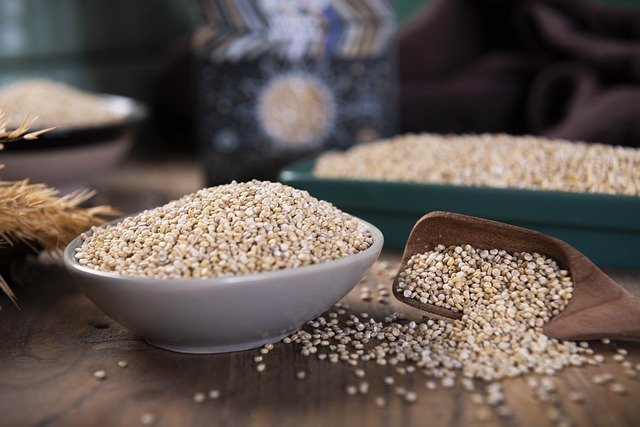Dietary protein is a vital macronutrient, featuring essential and non-essential amino acids that facilitate multiple body functions necessary for life sustenance. Proteins supply amino acids for cell repair and regeneration, promoting tissue and muscle growth.
Second, protein amino acids are also crucial for growth and development, especially for children and pregnant mothers. Third, amino acids are building blocks for functional enzymes and hormones and energy sources for enzyme reactions.
One expert report recommended taking 0.8g of protein per kg of body weight daily. So below is the list of ten rich animal and plant protein sources for healthy living.
Top 10 Protein-Rich Foods
1. Soy Foods
Soy foods are products extracted from the soybean, a protein-rich legume from the pea family. The soybean is among the complete plant protein sources, meaning it has all the essential amino acids in suitable quantities to meet human dietary requirements.
According to a report, Soybeans are cholesterol free and improve cardiovascular health compared to animal proteins with cholesterol. The report also shows that soybeans are rich in dietary fiber and other essential macronutrients like B vitamins and omega-3 fatty acids.
Popular soy foods include tofu, crude degummed soybean oil (also ideal as animal feed), soy milk, and soy cheese. Such foods are excellent complete protein options for vegans and non-vegans alike.
2. Eggs
Eggs are an affordable-readily available source of high-quality proteins. According to a health expert, one egg delivers 6g-8g of complete proteins against 70 grams of calories.
Also, eggs contain other nutrients, including A and B vitamins, omega-3 fatty acids, and antioxidants. Although the egg-white content is mostly protein, you get maximum nutritional benefit from eggs by eating the entire egg.

3. Salmonids (Salmon, Trout, Whitefish)
Salmonid fish (fish belonging to the Salmonidae fish family) are among the richest animal protein sources, offering complete proteins. Such fishes include salmon, trout, and whitefish.
The research report shows that salmonids contain approximately 20-25mg of protein per 3-4 ounces serving of fish. The protein content varies depending on the fish type and source (wild-water or farmed fish).
Salmonid fishes like salmon and trout are also rich in other macronutrients, including vitamin D, B vitamins, and omega-3 fatty acids. Taking a serving of salmon, trout, or whitefish every week is good for your health.
See also: 8 Food Packaging Ideas for Holiday Gift
4. Nuts
Nuts are a rich source of plant-based dietary protein, with protein quantities ranging from 4.5g per quarter cup to 9.5g per quarter cup. They function as healthy, and their protein content promotes satiety, preventing excessive calorie intake.
Popular protein-rich nuts in your diet include peanuts, almonds, cashews, pistachios, pine nuts, and hazelnuts. However, the above nuts vary in protein quality and quantity.
For example, peanuts have the highest protein quantity but are not a complete protein source. On the other hand, pistachios have the highest essential amino acid quantities.
Therefore, you can pair different nuts or consume them alongside seeds and other food groups to create complete protein profiles. Nuts are versatile; you can take them toasted, ground into butter, or crushed into other meals like Yogurt, desserts, and salads.
5. Lentils
Lentils are another plant-based fan-favorite protein source from the legume family. A cooked cup of lentils (approximately 200g/ 7 ounces) contains 18 grams of protein.
Like most plant-based protein sources, lentils are incomplete because they lack ideal quantities of essential amino acids. However, a study shows that sprouting lentils (soaking, draining, repeat) increases their protein percentage by 20%-23%.
6. Cottage Cheese
Cottage cheese is a dairy product containing all the essential amino acids in a complete protein. It has a higher protein quantity than traditional complete protein sources like eggs.
One 100g (3-4ounces) cottage cheese serving contains 11g protein. Additionally, cottage cheese is low in calories, and the high protein content promotes satiety. Cottage cheese is a versatile food option that you can enjoy as a snack on its own or in other foods like dips, salads, lasagna, and quiches.
7. Greek Yoghurt
Greek Yogurt or strained yogurt is a complete protein source, with one six-ounce serving of Yogurt containing 15g of protein. The straining process utilized in the making of Greek yogurt eliminates more whey content, giving the Yogurt a thicker consistency and a higher protein content than regular Yogurt.
Besides a high protein content, Greek Yogurt has a higher probiotic content for gut health. You can pair Greek yogurt with other protein-rich foods like seeds and nuts.
8. Quinoa
Quinoa is an edible food rich in protein. According to one report, a cup of cooked quinoa contains 8g of protein. The report also states that quinoa is a complete protein, unlike most plant proteins.

9. Chia Seeds
Food experts classify chia seeds as a “superfood” or functional food offering health benefits beyond their nutritional value. Chia seeds are high in macronutrients, including 17g of protein per 100g serving. The seeds are a versatile complete protein source you can add to any meal.
10. Spinach
Although famous for its vitamin content, spinach is among the top vegetables with amazing protein content. A 100g spinach serving contains 2.9 grams of protein.
Spinach contains all nine essential amino acids, but some of these amino acids occur in trace amounts. Therefore, consider pairing vegetables with other protein-rich foods.
See also: 8 Essential Gadgets for Kitchen (For easy kitchens)
Conclusion
Adding the protein-rich foods highlighted above to your diet is good for your musculoskeletal health, among other benefits. However, protein intake requirements vary among individuals due to factors like activity level. Therefore, consult an expert on your ideal protein intake and adjust your diet accordingly.



